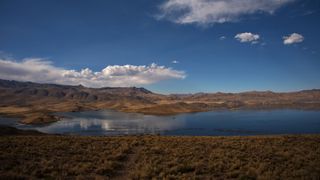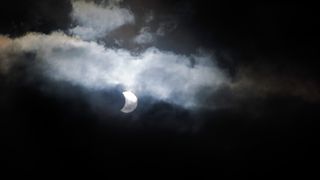
Eos.org
Eos is the award-winning science news magazine published by AGU.
Latest articles by Eos.org
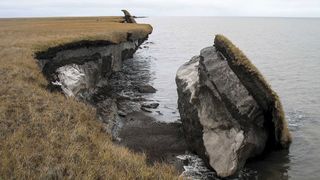
Arctic 'methane bomb' may not explode as permafrost thaws, new study suggests
By Nathaniel Scharping, Eos.org published
Methanotrophs, including those that capture methane from the air, seem to outcompete methanogens in dry environments, a new study shows.
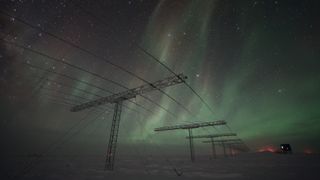
Earth's magnetic field has a weak spot — and it's getting bigger, putting astronauts and satellites at risk
By Tom Metcalfe, Eos.org published
This could be bad news for satellites and spacefarers.
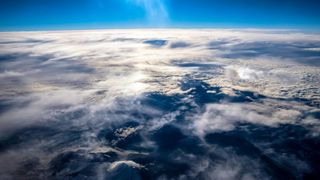
Weird symmetry between Earth's Northern and Southern Hemispheres appears to be breaking
By Larissa G. Capella, Eos.org published
The Northern Hemisphere is absorbing more sunlight than the Southern Hemisphere, and clouds can no longer keep the balance.
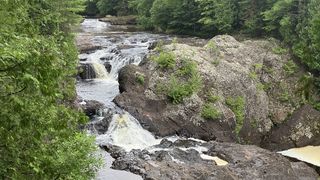
Lake Superior rocks reveal build up to giant collision that formed supercontinent Rodinia
By Aaron Sidder, Eos.org published
Using paleomagnetic samples collected along the shores of Lake Superior, a new study illuminates the movement of a billion-year-old paleocontinent as it crept south toward a tectonic collision.
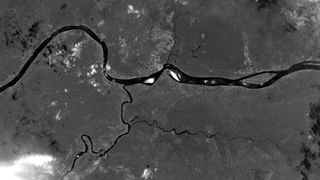
Scientists say these North American rivers 'shouldn't exist.' Here's why they do.
By Rebecca Dzombak, Eos.org published
At first glance, these waterways make no sense. A new review article details why they are the way they are.

Ancient seafloor spreading 15 million years ago caused sea levels to plummet
By Sarah Stanley, Eos.org published
Between 15 million and 6 million years ago, a drop in ocean crust production may have lowered sea level by 26 to 32 meters.
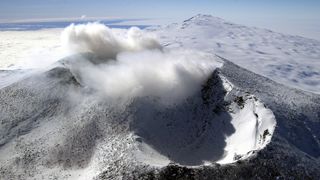
Antarctica ice melt could cause 100 hidden volcanoes to erupt
By Madeline Reinsel, Eos.org published
More than 100 volcanoes lurk beneath the surface in Antarctica. Ice sheet melt could set them off.
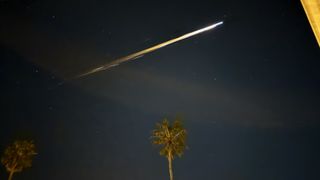
A Chinese spacecraft burned up over Los Angeles. Earthquake sensors mapped its path through the atmosphere.
By Farah Aziz Annesha, Eos.org published
A Chinese spacecraft that burned up high over Los Angeles created a sonic trail detected by ground-based sensors.
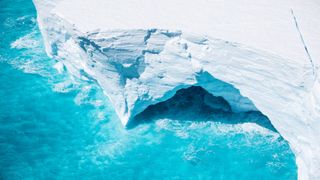
Massive Antarctic icebergs' split from glaciers may be unrelated to climate change
By Eos.org, Rebecca Dzombak published
The first analysis of extreme calving events in Antarctica finds no correlation with climate change, highlighting the significance of common, smaller calving events for ice loss and instability.
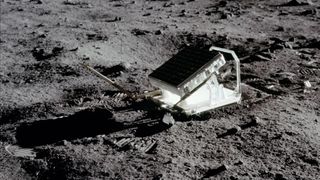
Time moves faster on the moon, new study of Einstein's relativity shows
By Matthew R. Francis, Eos.org published
Using Einstein's theory of general relativity, physicists found that clocks on the moon would run 56 microseconds faster than clocks on Earth. That finding will help future lunar missions navigate.

Mass extinctions make life 'bounce back stronger,' controversial study suggests
By Grace van Deelen, Eos.org published
Large-scale disruptions to life may ultimately increase ecological complexity over geologic timescales, though the risk of extinction always looms.
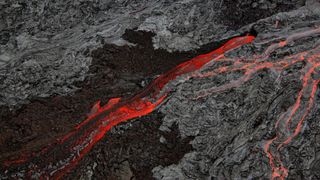
'Cryptic carbon' may leak from volcanoes millions of years after eruptions end
By Skyler Ware, Eos.org published
Dissolved carbon dioxide may have bubbled up from magma far below Earth's surface, contributing to prolonged warming.
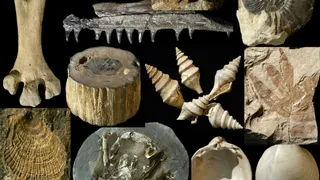
Meet FRED: The world's 1st-ever, nearly complete fossil database
By Kate Evans, Eos.org published
The near-complete database reflects a spirit of trust and collaboration among the country’s scientific community — but will it last?
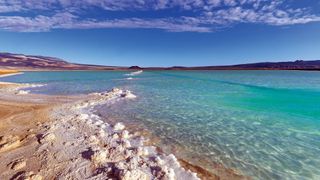
Huge lithium deposits are in Nevada. Here's why.
By Evan Howell, Eos.org published
Nevada is becoming a major producer of lithium, thanks to topography, climate, and geologic serendipity.
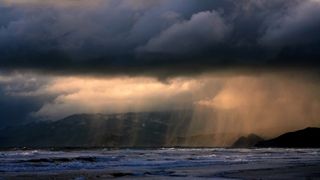
Rain helps the ocean trap more carbon
By Veronika Meduna, Eos.org published
Rain has so far been ignored in calculations of the ocean's capacity to take up carbon, but a new estimate shows it enhances the ocean sink by 5% to 7%.
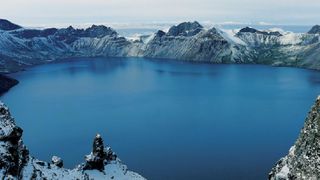
How a catastrophic volcanic eruption on the North Korea border created 'Heaven Lake'
By Saima May Sidik, Eos.org published
More than a thousand years ago, Heaven Lake flooded the surrounding area when the Changbaishan-Tianchi volcano, on the border between China and North Korea, erupted.
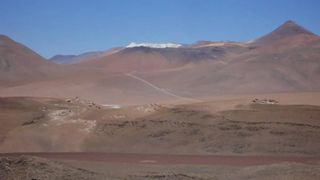
Mystery iron-rich magma entombed in dead volcanoes could be rich source of rare earth elements
By Kimberly M. S. Cartier, Eos.org published
Experiments show how concentrations of rare earth elements, critical to the green energy transition, might be hiding in plain sight in iron-rich deposits around the world.
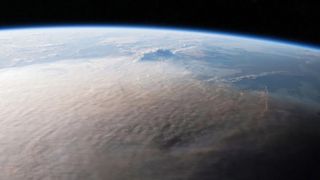
Tonga eruption that poured 150 metric megatons of water vapor into the stratosphere affected the atmosphere for years
By Rebecca Owen, Eos.org published
A new study builds on previous research into the underwater volcano's effects on the climate.
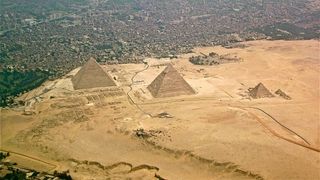
Ancient Egyptians used so much copper, they polluted the harbor near the pyramids, study finds
By Evan Howell, Eos.org published
New geoarchaeological research shows that metalworking in ancient Egypt led to significant contamination in a nearby port.
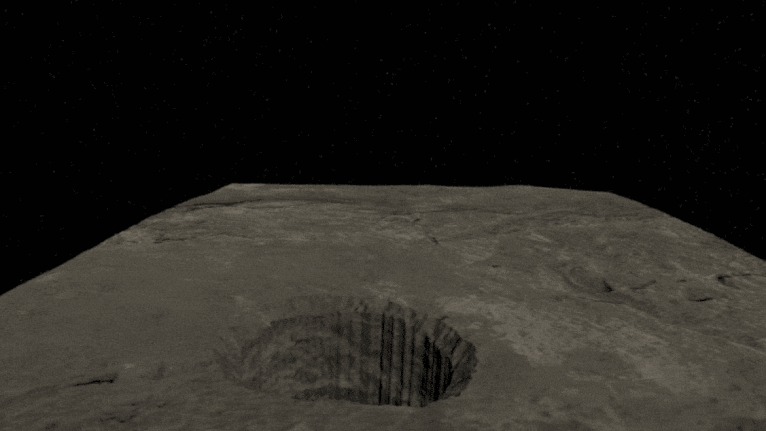
Scientists just found the 'front door' to a massive cave on the moon
By Kimberly M. S. Cartier, Eos.org published
The Sea of Tranquility is home to at least one lunar lava tube, which could preserve a pristine and unweathered record of lunar volcanism.
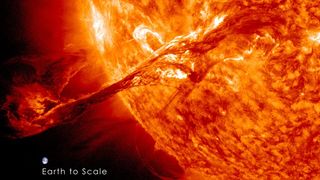
Powerful solar eruption temporarily rips 'tail' off Earth's magnetosphere
By Nathaniel Scharping, Eos.org published
A massive disturbance in the solar wind caused Earth’s magnetosphere to fly without its usual tail.
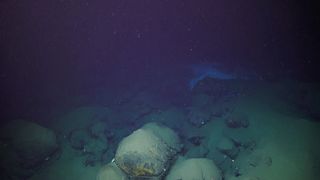
Tonga eruption entombed deep-sea life in ash
By Andrew Chapman, Eos.org, Eos.org published
When Hunga erupted in 2022, ash "decimated" slow-moving species living on the seafloor. More mobile species were able to hoof it out of harm's way.

'Upwelling' deep in the mantle triggered magnitude 6.8 Morocco earthquake
By Rebecca Owen, Eos.org published
Researchers found the 2023 Morocco earthquake was triggered by movement miles below Earth's surface.
Get the world’s most fascinating discoveries delivered straight to your inbox.
